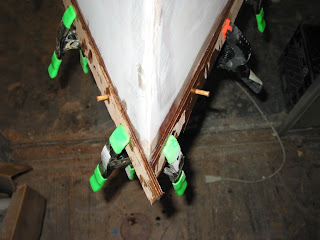Today was a big day in the build process of any boat, the flip. I finished up the 3rd layer of the rubrail last night in preparation for today. It all went well, just took longer than I expected, about 4-5 hours for each layer. It stiffened the boat up a good bit, but the tension from it pulled the sides of the boat away from the frames as well. More on that later.
The only place where the boat was attached to the frames was the transom, so those screws came out and we were ready to pop it off the strongback. After remembering to disconnect the transom knees halfway through the move, Frank and I wrestled it out into the front yard. For what it is, an 18 ft boat, it is amazingly light (maybe 100 lbs.) But with just the two of us trying to lift it over our heads to get it off the frames, it was a bear. I think I pulled something in my neck. It's still howling tonight after 2 BC's and 2 Sierra Nevada's.
Anyway, here she is in all her glory:



The truck and flatbed in the background are borrowed from my dad and will transport this Bad Larry to its new home in the Panhandle. It was still tough to get a great shot, but you can at least get a better idea of the lines. She just looks fast, being shaped a lot like what I think a boat tail rifle bullet looks like. The main task for the day was to make a cradle to affix to the strongback to hold the flipped boat. This is the kind of thing that Frank is good at and he took the lead on the design. In short order, we had 4 cradles to match the hull.

Some scrap carpet and trimming of the ends of the cradles and they were ready to screw to the strongback. In the flipped boat, you may be able to see where I marked the locations of all the interior pieces while it was still on the frames.

While most people will keep the whole stringer/frames assembly intact, flip it and put it back in the boat, I don't have room to do that. I broke down all the frames and stringers and stacked them to the side, so I need to know the exact locations of everything I took out, so I can later put them back in.
The cradles we made held the boat well, but the strongback was now way to high to get into the interior to do the next glassing step. The boat came back off and some very bootleg engineering brought the whole assembly to a more reasonable height.

Yes, my shop is an embarrassing mess. This is standard and I think goes well with the hurricane damage hole in the ceiling. Have to get it cleaned before the next big glassing party. Like I mentioned before, one problem that I noticed when we test fitted the frames was that with the force of the rubrail bowing it out the whole thing has sort of opened like a book in the middle, pulling the sides away from the frames. This has been exacerbated by the flip because the weight of the sides pulling down now make it worse. With some ratchet straps cinching it together at the frames, it has all came together beautifully though. Dealing with the straps will be impossible when we glass, so we'll make some presized braces based on the current beam that will pull the sides in right after we do the inside (thanks for the tip Bob). With the glass still wet, we hope this will help in retaining the proper shape.
I have to say that I'm proud of myself today. After months of sanding, today it hit me, I'm actually building a freaking boat. For the first time, I feel like fishing out of this thing is in the forseeable future. Sweet. I think I'll go have another beer. Cheers everyone.
Elie


























